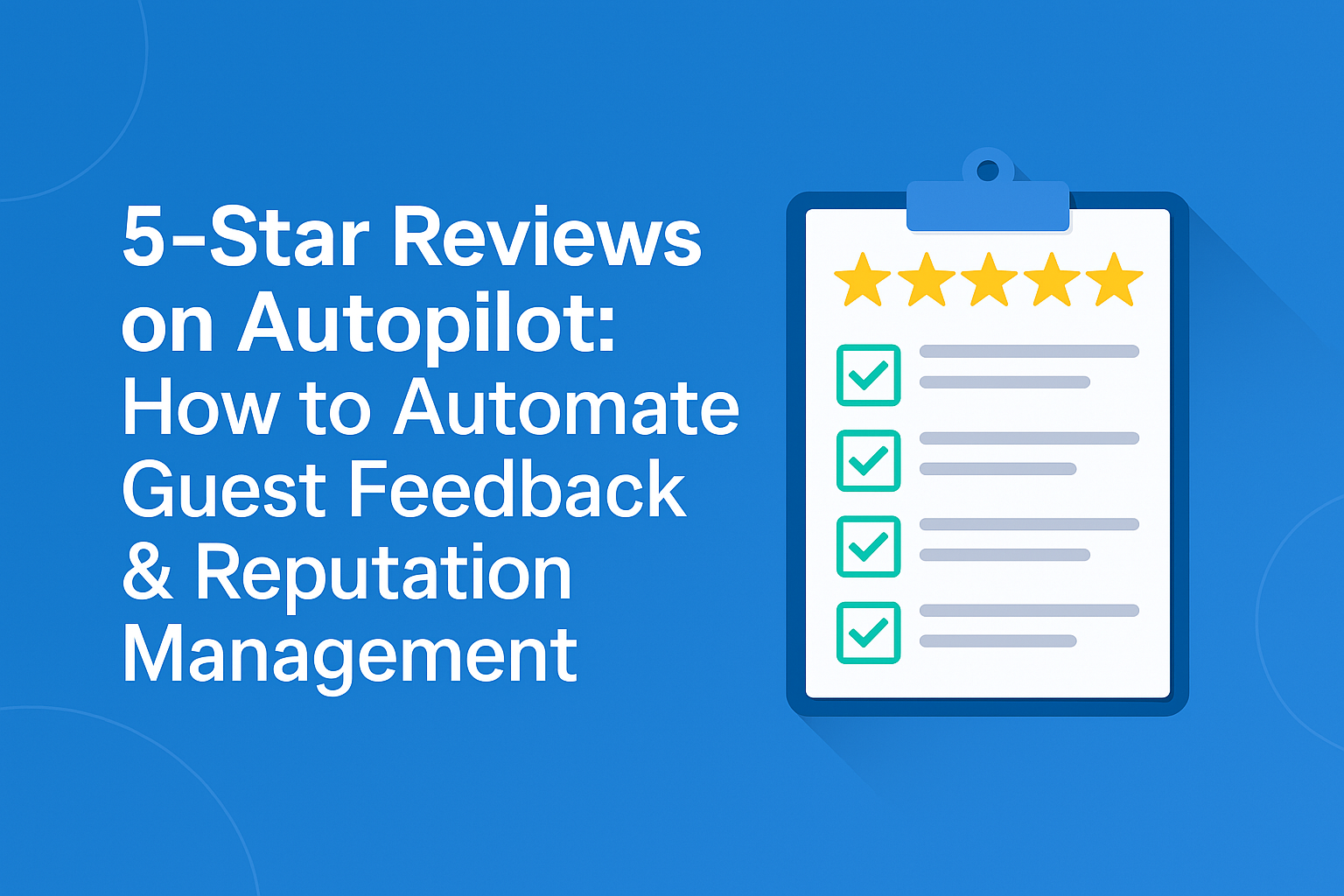Why Automating Guest Feedback & Reputation Management Matters
Strong online reviews drive success in hospitality. Properties with top ratings on Airbnb, Booking.com, TripAdvisor, and Google attract more guests, increase revenue, and stand out. Manual reputation management is inefficient, making automation the key to maintaining a stellar image.
The Role of Automation in Guest Feedback
Automation enhances review collection, analysis, and engagement. AI-driven tools ensure consistent interactions, increasing positive feedback. Businesses that effectively leverage automation can maintain an edge over competitors by securing higher review counts, improved guest satisfaction, and enhanced online presence.
Key Benefits of Automation:
- Saves Time: No manual review requests—automated systems do the work.
- Increases Review Volume: More guests leave feedback when prompted automatically.
- Ensures Consistency: Every guest receives engagement at the right time.
- Enhances Experience: Quick responses improve satisfaction.
- Boosts SEO Rankings: More positive reviews improve search visibility.
- Reduces Negative Feedback: Immediate guest engagement helps address concerns proactively.
- Strengthens Brand Trust: Positive ratings improve credibility and influence potential guests.
How to Automate Guest Feedback & Reputation Management
1. Use Automated Review Request Systems
Automated review platforms integrate with booking systems, prompting guests to leave feedback post-stay. These systems ensure that guests are encouraged to share their experiences while still engaged with the brand, reducing the likelihood of missed reviews or forgotten feedback.
Top Tools for Automated Requests:
- Airbnb’s Built-In System: Sends reminders automatically.
- Revinate: AI-powered guest feedback management.
- Trustpilot & Feefo: Collects reviews across multiple platforms.
- Google My Business Tools: Encourages Google reviews for visibility.
- TripAdvisor Review Express: Automates review collection from past guests.
- ReputationStacker: Aggregates reviews and directs satisfied guests to key platforms.
2. Implement Email & SMS Review Campaigns
Emails and texts increase review responses. Automated campaigns engage guests at the right moment. A well-crafted email sequence ensures a higher response rate and encourages guests to provide detailed, constructive feedback.
Best Practices:
- Send requests within 24 hours of checkout.
- Personalize messages with guest names.
- Keep messages short and clear.
- Provide a direct review link.
- Offer future stay discounts for feedback.
- Use multiple touchpoints—follow-up reminders can increase response rates by up to 20%.
- A/B test email subject lines and messages to identify the most effective format.
3. Use Chatbots for Real-Time Interaction
AI chatbots enhance guest experience and resolve concerns before they lead to negative feedback. Integrating smart chatbots into guest communication helps resolve common concerns, booking issues, and service requests before they become complaints.
Chatbot Features That Improve Reputation:
- Instant Replies: Address concerns any time.
- Feedback Collection: Request ratings after service.
- Issue Resolution: Escalate problems to support staff.
- Pre-Screening Feedback: Chatbots can determine if the guest had a positive experience and guide them toward leaving a review or providing private feedback for improvements.
4. Monitor & Respond to Reviews Effectively
Reputation management requires active monitoring of guest feedback. Automated tools track reviews in real time, allowing businesses to quickly address both positive and negative reviews.
Best Tools for Review Monitoring:
- Google Alerts: Tracks brand mentions.
- Reputation.com: AI-powered multi-platform review management.
- Podium: Consolidates and automates review responses.
- Grade.us: Enables bulk review replies.
- ReviewTrackers: Aggregates reviews across multiple platforms for streamlined responses.
- SocialMention: Monitors real-time feedback from social media and review sites.
5. Leverage AI for Sentiment Analysis
AI tools analyze guest sentiment, helping businesses improve services. By understanding trends in guest feedback, businesses can proactively enhance services and address recurring issues before they escalate.
Top Sentiment Analysis Tools:
- MonkeyLearn: AI-powered review analyzer.
- Lexalytics: Converts text into insights.
- Hootsuite Insights: Tracks sentiment across platforms.
- Brandwatch: Identifies patterns in feedback data to predict future guest expectations.
- Clarabridge: Analyzes tone, sentiment, and context of guest reviews.
6. Encourage User-Generated Content & Social Proof
Guest-generated content, like photos and testimonials, strengthens brand credibility. Automated tools help curate and share content, allowing businesses to capitalize on organic marketing.
Ways to Encourage Content Sharing:
- Send post-stay requests for social media shares.
- Use a branded hashtag for guest photos.
- Feature top reviews on the business website.
- Offer incentives for guests who share their stay experience online.
- Leverage influencer partnerships to boost brand recognition.
Automating Reputation Management for Long-Term Success
1. Automate Review Responses
AI tools generate thoughtful responses to guest reviews, saving time while maintaining authenticity. The ability to quickly acknowledge feedback demonstrates strong customer service.
Best AI-Powered Response Tools:
- ChatGPT-based Assistants: Human-like responses.
- Reputation Studio: Bulk review replies with personalization.
- Birdeye: AI-driven review replies.
- Revuze: Automated insights and response suggestions for businesses handling high review volumes.
2. Showcase Reviews on Your Website
Displaying real-time guest reviews builds trust and boosts conversions. Plugins automatically pull top reviews for display.
Best Review Integration Tools:
- TrustPulse: Displays live review notifications.
- EmbedSocial: Pulls Google and Facebook reviews.
- WP Review Plugin: Ideal for WordPress users.
- Taggbox: Integrates Instagram and guest-generated content for website display.
- Elfsight: Customizable review widgets for site embedding.
3. Manage Negative Feedback Efficiently
Automated workflows identify and resolve low-rated reviews before they harm reputation. Negative feedback should be handled with a proactive strategy, ensuring guest concerns are addressed swiftly.
Steps to Handle Negative Reviews:
- Flag and address low ratings instantly.
- Send personalized apology emails.
- Request review updates after resolution.
- Implement a dedicated resolution team to follow up on flagged concerns.
- Use AI to analyze recurring complaints and adjust business practices accordingly.
4. Build a Long-Term Automation Strategy
Investing in automated reputation management is a long-term commitment. Continuous refinement of AI tools, review collection strategies, and guest engagement ensures ongoing improvement.
Key Steps for a Sustainable Strategy:
- Regularly update automation tools for better efficiency.
- Monitor competitor reputation management tactics.
- Train staff on leveraging automation while maintaining a personal touch.
- Continuously refine messaging based on guest response data.
- Implement AI-powered CRM systems for comprehensive guest management.
Conclusion: Elevate Your Reputation with Automation
Automating feedback and reputation management ensures a strong online presence with minimal effort. From AI-driven sentiment analysis to automated review collection, businesses can gain more 5-star reviews, stronger engagement, and higher search rankings. Investing in automation is the key to long-term success.
Latest Posts:
- Superhost Secrets: The Fastest Way to Achieve & Maintain Superhost Status
- How to Get More Repeat Bookings & Build a VIP Guest List
- 5-Star Reviews on Autopilot: How to Automate Guest Feedback & Reputation Management
- Luxury Airbnb Pricing Strategy: How to Charge $500+/Night Consistently
- Why Every High-End Airbnb Needs a Direct Booking Website (And How to Set One Up)

